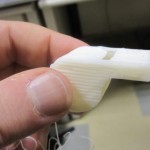[Post updated] Recently the Justice Department received some bad publicity when a government watchdog report claimed the government wasn’t doing much in its efforts to clean up the lending industry. There may be some truth to those reports but you wouldn’t know it from looking at the impressive list of convictions and civil victories coming from Preet Bharara, the United States Attorney for the Southern District of New York (Manhattan). Bharara’s office is just one of 93 US Attorneys offices nationwide but his district has collected billions from the banking industry.
With that introduction as a backdrop, we were not surprised last week when an assistant United States attorney in Manhattan said the government wanted a higher penalty from Rebecca Mairone, former Chief Operating Officer of Countrywide’s (later Bank of America) Full Spectrum Lending division. The government wants more money from the bank as well.
Last October, Bank of America took the unusual step of taking its case to a jury. Most banks settle in the hopes that early acceptance of responsibility will lower the penalties. Bank of America, however, “rolled the dice” and sought to prove their innocence. They lost. At a hearing last week, the Justice Department told the court it wants the bank to pay $2.1 billion and Ms. Mairone to personally pay as much as $1.6 billion. Previously, the government sought $864 million from the bank.
[The only other major banking case to go to a jury was the 2016 trial involving Allied Home Mortgage, a case filed by our office. A jury returned a $90 million verdict which was tripled by the court. the ultimate $268 million judgment was upheld on appeal.]
The $864 million dollar damage figure was calculated on the money the bank made from selling certain bad loans to Fannie Mae and Freddie Mac. (Both companies ran out of money during the mortgage crisis and had to receive TARP bailout monies to stay solvent.) Now the government says that the bank should pay a penalty based on the total gains the bank received from the faulty lending program.
In a filing with the court, the government said, “[The] defendants committed a massive fraud by originating thousands of toxic mortgage loans and selling them to Fannie Mae and Freddie Mac with lies… In an effort to not pay any penalty based on its gain, the bank contends that the Court must deduct all manner of expenses in order to reduce the maximum pecuniary gain to zero.”
The government has been equally assertive in its damage claims against Mairone. After learning that Mairone just received a $487,000 bonus from her current employer, the feds say she should also pay more. According to Assistant U.S. Attorney Pierre Armand, Marione’s penalty “needs to be severe enough to deter others.”
Marione’s lawyer disagrees. He believes that she should not have to pay any monetary penalty despite a jury having found her personally liable. According to a Wall Street Journal story, the lawyer questioned why any penalty should fall on a “single woman with two kids.”
Although we don’t know how much Mairone was paid at Bank of America, obviously she earns good money if just last year her current employer J.P. Morgan Chase paid her almost $500,000 in bonus money.
The case against Mairone and Bank of America was brought by a whistleblower under the Financial Institutions Reform Recovery and Enforcement Act. “FIRREA”, as the law is commonly called, and the federal False Claims Act have provisions that allow whistleblowers to be paid a percentage of whatever the government collects.
[Update: Shortly after this story was first written, a federal appeals court tossed the jury verdict against Mairone and Bank of America. The court looked at that jury’s verdict and asked this question: If a bank “enters into a contract pure of heart and only deceives its partners afterward, is that fraud?” Sadly the court said “no.”
Mairone was vindicated but Bank of America’s joy was short lived.
Just months later Bank of America was agreed to pay a much higher amount, $16.67 billion in settlement of whistleblower claims we helped file. The recovery is the highest civil recovery against a single defendant in US history. We are proud to have represented two of the three whistleblowers in that case.]
Bank Whistleblowers Are the New American Heroes
Taxpayers across the country are sick and tired of the abuses brought on by America’s “too big to fail” banks. We constantly get calls and emails from former bank employees, loan officers and even some customers with inside information about fraud and corruption within the banking industry.
Most folks that contact a whistleblower lawyer do so out of civic duty in a desire to stop fraud. Some call us because of the ability to receive millions in whistleblower awards. Whatever the motivation, there are plenty of other cases waiting to be discovered.
Whistleblower cases are not limited to big banks. Almost any fraud by a bank or mortgage company may be eligible as are Medicare fraud schemes and fraud involving government construction projects, defense spending and government contracting. Twenty nine states and New York City have similar laws as well. (Presently we are also seeking cases involving mortgage servicers.)
If you believe you have a potential whistleblower claim, your first step should be finding a great whistleblower lawyer with plenty of experience. The right attorney can often mean the difference between the government not taking your case and a multimillion dollar whistleblower award. Each year the government pays hundreds of millions of dollars in rewards. Finding the right lawyer helps ensure you get the maximum reward possible.
For more information, visit our False Claims Act Financial Fraud and FIRREA bank fraud whistleblower pages. Ready to see if you have a case? Contact attorney Brian Mahany at or by telephone at (direct). Inquiries kept confidential.
(Whistleblower photo courtesy of Dave Winer – scriptingnews)


